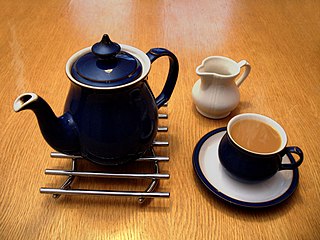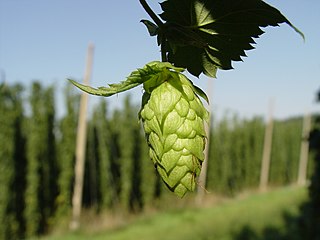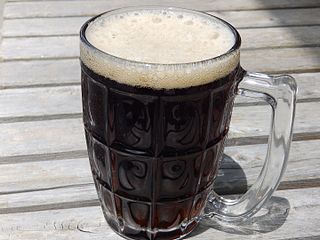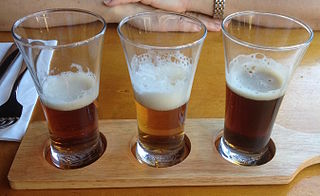Related Research Articles

Beer is one of the oldest types of alcoholic drinks in the world, and the most widely consumed. It is the third most popular drink overall after potable water and tea. It is produced by the brewing and fermentation of starches, mainly derived from cereal grains—most commonly malted barley, though wheat, maize (corn), rice, and oats are also used. During the brewing process, fermentation of the starch sugars in the wort produces ethanol and carbonation in the resulting beer. Most modern beer is brewed with hops, which add bitterness and other flavours and act as a natural preservative and stabilising agent. Other flavouring agents such as gruit, herbs, or fruits may be included or used instead of hops. In commercial brewing, the natural carbonation effect is often removed during processing and replaced with forced carbonation.

A drink or beverage is a liquid intended for human consumption. In addition to their basic function of satisfying thirst, drinks play important roles in human culture. Common types of drinks include plain drinking water, milk, juice, smoothies and soft drinks. Traditionally warm beverages include coffee, tea, and hot chocolate. Caffeinated drinks that contain the stimulant caffeine have a long history.

Marrubium vulgare is a flowering plant in the mint family (Lamiaceae), native to Europe, northern Africa, and southwestern and central Asia. It is also widely naturalized in many places, including most of North and South America.

Hops are the flowers of the hop plant Humulus lupulus, a member of the Cannabaceae family of flowering plants. They are used primarily as a bittering, flavouring, and stability agent in beer, to which, in addition to bitterness, they impart floral, fruity, or citrus flavours and aromas. Hops are also used for various purposes in other beverages and herbal medicine. The hops plants have separate female and male plants, and only female plants are used for commercial production. The hop plant is a vigorous, climbing, herbaceous perennial, usually trained to grow up strings in a field called a hopfield, hop garden, or hop yard when grown commercially. Many different varieties of hops are grown by farmers around the world, with different types used for particular styles of beer.

Mead, also called hydromel, is an alcoholic beverage made by fermenting honey mixed with water, and sometimes with added ingredients such as fruits, spices, grains, or hops. The alcoholic content ranges from about 3.5% ABV to more than 20%. The defining characteristic of mead is that the majority of the beverage's fermentable sugar is derived from honey. It may be still, carbonated, or naturally sparkling; dry, semi-sweet, or sweet.

Root beer is a sweet North American soft drink traditionally made using the root bark of the sassafras tree Sassafras albidum or the vine of Smilax ornata as the primary flavor. Root beer is typically, but not exclusively, non-alcoholic, caffeine-free, sweet, and carbonated. Like cola, it usually has a thick and foamy head. A common use is to add vanilla ice cream to make a root beer float.

Chamomile or camomile is the common name for several daisy-like plants of the family Asteraceae. Two of the species, Matricaria chamomilla and Chamaemelum nobile, are commonly used to make herbal infusions for beverages. There is insufficient scientific evidence that consuming chamomile in foods or beverages has any beneficial effects on health, although in Hungarian they refer to it as king of herbs 'orvosi székfű'.

Thai Beverage, better known as ThaiBev (Thai: ไทยเบฟ), is Thailand's largest and one of Southeast Asia's largest beverage companies, with distilleries in Thailand, UK, and China. It is owned by Thai Chinese billionaire business magnate Charoen Sirivadhanabhakdi. Listed on the Singapore Stock Exchange, Thai Beverage plc has a market capitalization in excess of US$13 billion.

Gruit is a herb mixture used for bittering and flavouring beer, popular before the extensive use of hops. The terms gruit and grut ale may also refer to the beverage produced using gruit. Historically, gruit is the term used in the historic Low Countries and the Holy Roman Empire. Today, however, gruit is a colloquial term for any beer seasoned with gruit-like herbs.

Purposeful production of alcoholic drinks is common and often reflects cultural and religious peculiarities as much as geographical and sociological conditions.

Beer styles differentiate and categorise beers by colour, flavour, strength, ingredients, production method, recipe, history, or origin.
Horehound or hoarhound may refer to:
Flavored liquors are liquors that have added flavoring and, in some cases, a small amount of added sugar. They are distinct from liqueurs in that liqueurs have a high sugar content and may also contain glycerine.
An alcohol-free or non-alcoholic drink, also known as a temperance drink, is a version of an alcoholic drink made without alcohol, or with the alcohol removed or reduced to almost zero. These may take the form of a non-alcoholic mixed drink or non-alcoholic beer, and are widely available where alcoholic drinks are sold.
A bittering agent is a flavoring agent added to a food or beverage to impart a bitter taste, possibly in addition to other effects. While many substances are bitter to a greater or lesser degree, a few substances are used specifically for their bitterness, especially to balance other flavors, such as sweetness. Notable beverage examples include caffeine, found naturally in tea and coffee and added to many soft drinks, hops in beer, and quinine in tonic water.

An alcoholic beverage is a drink that contains ethanol, a type of alcohol that acts as a drug and is produced by fermentation of grains, fruits, or other sources of sugar. The consumption of alcoholic drinks, often referred to as "drinking", plays an important social role in many cultures. Most countries have laws regulating the production, sale, and consumption of alcoholic beverages, and the temperance movement advocates against the consumption of alcoholic beverages. Regulations may require the labeling of the percentage alcohol content and the use of a warning label. Some countries ban such activities entirely, but alcoholic drinks are legal in most parts of the world. The global alcoholic drink industry exceeded $1 trillion in 2018.
The type of the dishes of the Indian state of Arunachal Pradesh vary within the region, according to tribal influence

Apo, apong, or poka is an alcohol drink commonly found among the tribes in the Northeast India states of Arunachal Pradesh and Assam. It is prepared by fermentation of rice. It is known by various names across different tribes in Arunachal Pradesh and Assam.
References
- Horehound at Botanical.com
- Facciola. S. Cornucopia - A Source Book of Edible Plants. Kampong Publications 1990 ISBN 0-9628087-0-9
- Bown. D. Encyclopaedia of Herbs and their Uses. Dorling Kindersley, London. 1995 ISBN 0-7513-0203-1
- Grieve. A Modern Herbal. Penguin 1984 ISBN 0-14-046440-9